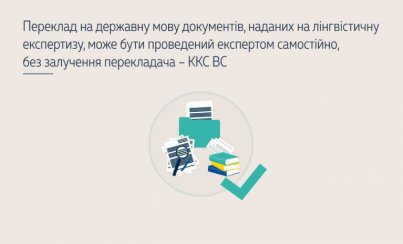Contact center of the Ukrainian Judiciary 044 207-35-46

This conclusion was reached by the Criminal Cassation Court of the Supreme Court following the consideration of case No. 148/31/23.
In this criminal proceeding, the courts of previous instances found the accused guilty and convicted him under Part 2 of Art. 161; Part 3 of Art. 436-2; Part 3 of Art. 15, Part 2 of Art. 109; Part 3 of Art. 15, Part 1 of Art. 110 of the Criminal Code of Ukraine. In the cassation appeal, the defence counsel argued that the court decisions were incorrect because, during the linguistic examination, the expert was provided with the article and leaflets in Russian, but no Ukrainian translation was produced with the involvement of a translator. Instead, the expert translated the texts from Russian into Ukrainian independently, without the assistance of a translator. This is not permitted by the provisions of the Criminal Procedure Code of Ukraine.
Upholding the decisions of the courts of previous instances, the Supreme Court stated that the provisions of Articles 68 and 69 of the CPC of Ukraine do provide that the translator and the expert are different participants in criminal proceedings, each with their own separate procedural tasks and functions. At the same time, it is the expert who is obliged to conduct a study of objects, phenomena and processes containing information about the circumstances of the criminal offence, including assessing the content of the source data provided to the expert for the examination.
The Criminal Cassation Court of the Supreme Court noted that, in accordance with paragraph 2.1 of the 'Instruction on the Appointment and Conduct of Forensic Examinations and Expert Studies', approved by Order No. 53/5 of the Ministry of Justice of Ukraine on 8 October 1998 (as amended on 26 December 2012 No. 1950/5), an expert may refuse to conduct an examination if the provided materials are insufficient for them to perform their duties and the requested additional materials are not provided, or if the questions raised exceed their area of expertise. In view of this, and since neither the expert nor the defence raised the issue of the need for the subject of the expert's appointment to provide a preliminary translation of the submitted documents into the state language, the argument that the expert could not have conducted the examination independently in these circumstances does not seem justified.
Resolution of the Criminal Cassation Court of the Supreme Court of 28 April 2025 in case No. 148/31/23 (proceedings No. 51-4336км24) – https://reyestr.court.gov.ua/Review/127136219.
This and other legal opinions of the Supreme Court are available in the Database of Legal Positions of the Supreme Court - https://lpd.court.gov.ua.